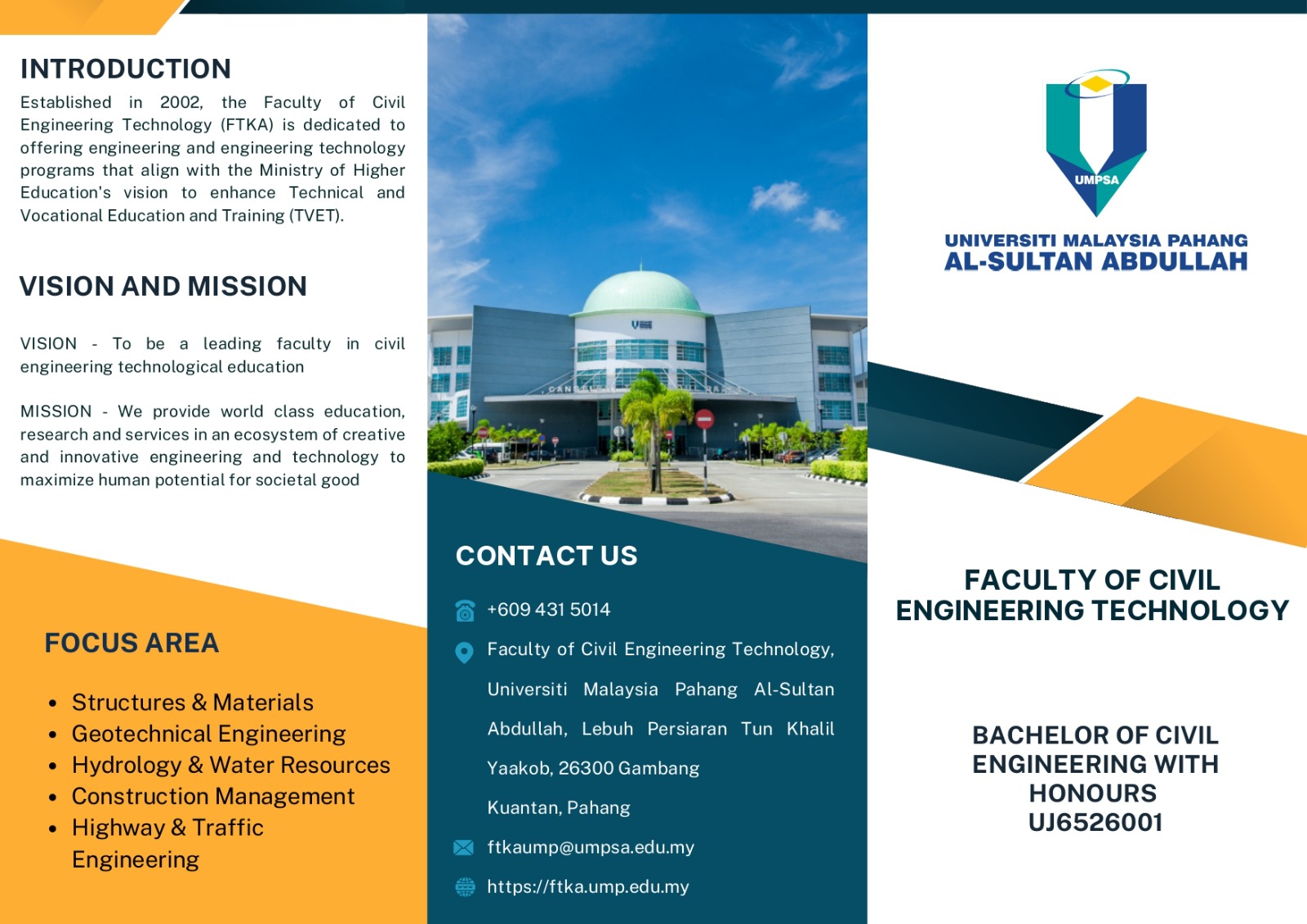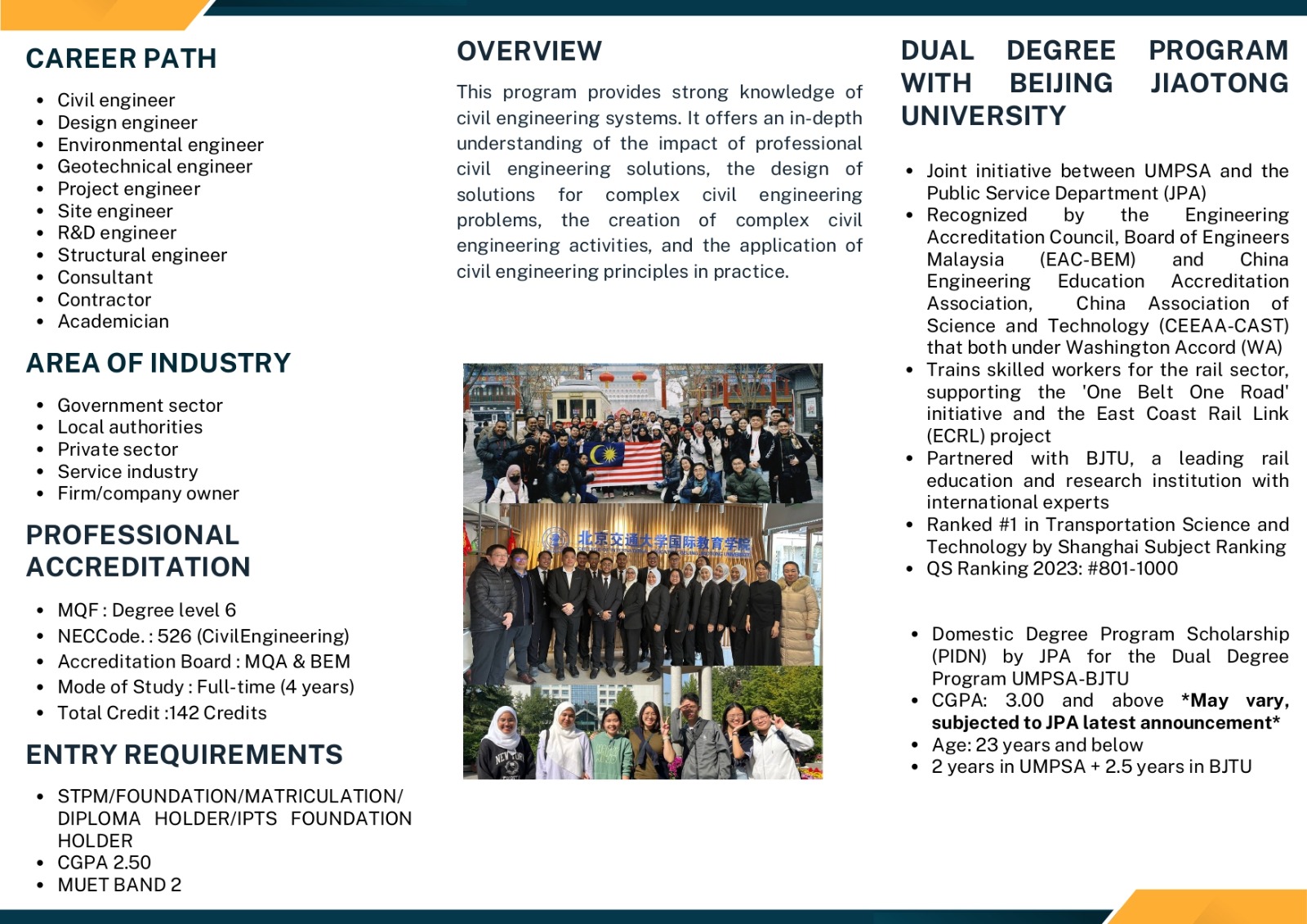Bachelors of Civil Engineering with Honours
- OVERVIEW
- PROGRAM EDUCATIONAL OBJECTIVES (PEO)
- PROGRAM OUTCOMES (PO)
- ENTRY REQUIREMENTS
- CAREER OPPORTUNITIES
- FEES
Bachelor of Civil Engineering Program (BAA) contains strong knowledge of the civil engineering system. It consists of in depth understanding on the impact of professional civil engineering solutions, design solutions for complex civil engineering problem, create complex civil engineering activities and apply principles of civil engineering in practice.
PEO1 : To produce competent graduates: Function independently to cater to the needs of the worldwide professional environment.
- PEO2 : To produce skilled graduates: Demonstrate creativity and innovativeness with leadership qualities to service the dynamic ecosystem.
- PEO3 : To produce graduates who demonstrate life-long learning: Pursue and engage in continuous self-improvement through research and professional development.
Programme Outcomes describe what students are expected to know and be able to perform or attain by the time of graduation. These relate to the skills, knowledge, and behaviour that students acquire through the programme. Students of an engineering programme are expected to attain the following POs:
(i) Engineering Knowledge - Apply knowledge of mathematics, natural science, computing and engineering fundamentals, and an engineering specialization as specified in WK1 to WK4 respectively to develop the solution to complex engineering problems;
(ii) Problem Analysis - Identify, formulate, research literature and analyze complex engineering problems reaching substantiated conclusions using first principles of mathematics, natural sciences and engineering sciences with holistic considerations for sustainable development (WK1 to WK4);
(iii) Design/Development of Solutions - Design creative solutions for complex engineering problems and design systems, components or processes to meet identified needs with appropriate consideration for public health and safety, whole life cost, net zero carbon as well as resources, cultural, societal, and environmental considerations as required (WK5);
(iv) Investigation - Conduct investigation of complex engineering problems using research-based knowledge and research methods, including design of experiments, analysis and interpretation of data, and synthesis of information to provide valid conclusions (WK8);
(v) Tool Usage - Create, select and apply, and recognized appropriate techniques, resources, and modern engineering and IT tools, including prediction and modelling, to complex engineering problems, (WK2 and WK6);
(vi) The Engineer and The World - Analyze and evaluate sustainable development impact to: society, the economy, sustainability, health and safety, legal frameworks, and the environment, in solving complex engineering problems (WK1, WK5, and WK7);
(vii) Ethics - Apply ethical principles and commit to professional ethics and norms of engineering practice and adhere to relevant national and international laws. Demonstrate an understanding of the need for diversity and inclusion (WK9);
(viii) Individual and Collaborative Team Work - Function effectively as an individual, and as a member or leader in diverse and inclusive teams and in multidisciplinary, face to face, remote and distributed settings (WK9);
(ix) Communication - Communicate effectively and inclusively on complex engineering activities with the engineering community and with society at large, such as being able to comprehend and write effective reports and design documentation, make effective presentations, taking into account cultural, languange and learning differences;
(x) Project Management and Finance - Apply knowledge and understanding of engineering management principles and economic decision-making and apply these to one’s own work, as a member and leader in a team, to manage projects in multidisciplinary environments;
(xi) Life Long Learning - Recognise the need for, and have the preparation and ability for i) indepedent and life-long learning ii) adaptability to new and emerging technologies and iii) critical thinking in the broadest context of technological change (WK8).
- STPM Holder
- Matriculation / Foundation Holder
- Diploma Holder
- IPTS Foundation Holder
More info on UMPSA ADMISSION
- Academician
- Civil Engineer
- Environmental Engineer
- Site Engineer
- Project Engineer
- Structure Engineer
- Design Engineer
- R&D Engineer
- Consultant
- Contractor
More info on PROGRAMME FEES



